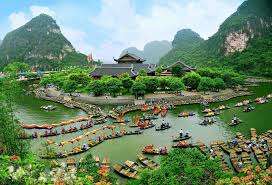Tailieumoi.vn xin giới thiệu đến các quý thầy cô, các em học sinh đang trong quá trình ôn tập tài liệu Đoạn văn Tiếng anh về bảo vệ di sản, tài liệu bao gồm có định nghĩa, công thức và các dạng bài tập, giúp các em học sinh có thêm tài liệu tham khảo trong quá trình ôn tập, củng cố kiến thức và chuẩn bị cho kì thi môn Tiếng anh sắp tới. Chúc các em học sinh ôn tập thật hiệu quả và đạt được kết quả như mong đợi.
Đoạn văn Tiếng anh về bảo vệ di sản
Đề bài: Viết đoạn văn tiếng anh 100 - 120 từ về bảo vệ di sản
Đoạn văn Tiếng anh về bảo vệ di sản - mẫu 1
Heritage conservation is the practice of protecting and preserving historical and cultural sites. It is important to protect heritage because it helps us to understand our past and to appreciate the diversity of cultures around the world.
There are many ways to protect heritage. One way is to educate people about the importance of heritage. This can be done through school programs, public awareness campaigns, and social media. Another way to protect heritage is to pass laws that protect historical and cultural sites. These laws can help to prevent looting, vandalism, and other forms of destruction.
Heritage conservation is a shared responsibility. Individuals, communities, and governments all have a role to play in protecting heritage. By working together, we can ensure that future generations will be able to appreciate and learn from the heritage of our past.
Here are some specific examples of heritage conservation:
The restoration of the Taj Mahal in India is a major example of heritage conservation. The Taj Mahal is a UNESCO World Heritage Site that was built in the 17th century. It is one of the most iconic landmarks in the world. The restoration project was completed in 2004 and it helped to preserve this important cultural site.
The preservation of the Great Wall of China is another example of heritage conservation. The Great Wall of China is the longest man-made structure in the world. It was built over a period of centuries and it is a symbol of Chinese culture. The Chinese government has taken steps to preserve the Great Wall, including building new sections of the wall and providing education about the importance of the wall.
The protection of ancient ruins is another important aspect of heritage conservation. Ancient ruins can provide us with valuable information about the past. They can help us to understand how people lived and how societies developed. Governments and organizations around the world work to protect ancient ruins from looting and vandalism.
Heritage conservation is important because it helps us to preserve our past for future generations. It helps us to understand our own cultures and the cultures of other people. It also helps to promote tourism and economic development. By working together, we can ensure that our heritage will be preserved for years to come.

Đoạn văn Tiếng anh về bảo vệ di sản - mẫu 2
Cultural identity is sacred and precious, it creates the unique characteristics of each nation. It was formed in the long history of a nation, summarized from life experiences, passed down through many generations. It exists naturally, is expressed on the outside but can also be hidden deep in the human soul. Preserving cultural identity is both a long-term and urgent requirement. There needs to be comprehensive plans and solutions to preserve and promote Vietnamese cultural identity. First of all, each person needs to realize that national culture is the stable root of each person's soul. Without growing up and firmly clinging to that root, each person is only an individual lost in the community. mine. Losing one's own cultural identity means losing the past, losing history, losing roots, and will be dissolved in other cultures in the current conditions of expanded international exchange. Therefore, learning and preserving human values in traditional culture is the process of recognizing the values of the Vietnamese people to help us be more confident about what we have, have and continue. Continue to promote it in current life.

Đoạn văn Tiếng anh về bảo vệ di sản - mẫu 3
Preserving heritage requires a multifaceted approach. Firstly, it is essential to raise awareness about the significance of cultural and historical sites among the public. Education plays a crucial role in fostering appreciation and respect for these treasures. Secondly, implementing strict conservation policies and regulations is vital to prevent damage and degradation. This involves conducting regular maintenance, restoration, and protection efforts. Thirdly, collaboration between governments, organizations, and local communities is necessary to ensure sustainable management and development of heritage sites. By actively engaging in preservation efforts, we can safeguard our cultural legacy for future generations to cherish and enjoy.